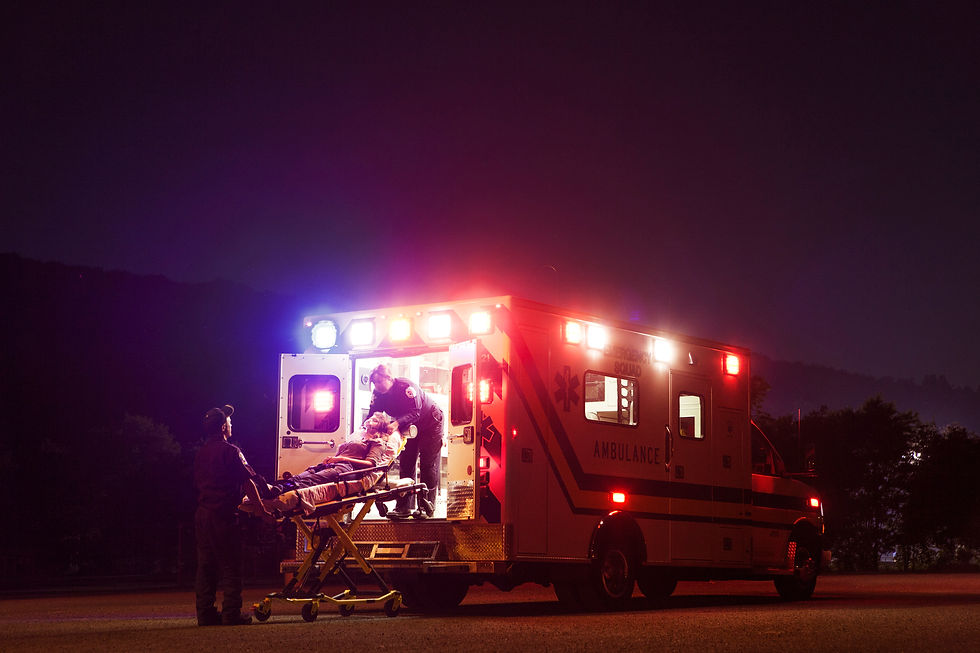Silent Shifts and Heavy Hearts: Coping with Holiday Stress and Burnout in EMS
- Missouri Ambulance Association

- Nov 21, 2025
- 3 min read
Updated: Jan 28
For most people, the holidays are filled with twinkling lights, warm gatherings, and a slower pace. For EMS professionals and first responders, however, the season often means increased call volume, high-acuity calls involving intense emotions, and the profound ache of missing precious family time due to shift work.
This time of year doesn't just add stress; it creates a "double-whammy" that rapidly accelerates burnout and strains EMS mental health. If you're feeling overwhelmed, disconnected, or just plain tired, please know that your feelings are valid and you are not alone.
The critical nature of your job demands constant resilience. But even the strongest people need intentional strategies to manage the unique pressures of the holiday season.
The Holiday Double-Whammy: Stressors Unique to EMS

Why are the holidays so tough? The usual stressors of long hours and traumatic calls are amplified by the contrast with the civilian world.
Emotional Compression: Your high-emotion calls (car accidents, domestic incidents, unexpected critical illness) happen against a backdrop of festive expectation. The emotional disparity between the public mood and the reality of your work is exhausting.
Disrupted Social Rhythms: Missing Christmas morning, New Year's Eve, or family dinners creates a sense of isolation and detachment. You feel disconnected from your own community and tradition.
Moral Injury: Witnessing the devastating impact of tragedy during a season centered on joy and togetherness can lead to moral injury, challenging your sense of fairness and hope.
The Pressure to be "Fine": There's often an expectation to jump back into cheerfulness immediately after a tough shift, leaving no room for essential emotional decompression.
Strategies for Resilience: Practical Coping Mechanisms
Building resilience isn't about ignoring the stress; it's about developing concrete, manageable habits to process it. These strategies are actionable, even during short breaks or busy shifts:

1. Prioritize Micro-Recovery
You can't always take a week off, but you can take five minutes. Use small pockets of downtime between calls for intentional recovery:
Tactical Breathing: Practice four-second inhale, six-second exhale to regulate your heart rate and calm your nervous system.
Disconnection: Put your phone down. Listen to music, read a few pages of a book, or step outside for fresh air, focusing only on the sensory input for five minutes.
2. Set Firm Boundaries
This is non-negotiable for protecting your time off.
Learn to Say "No": If working an extra shift means sacrificing your only family day, decline it (when possible). Your well-being benefits your performance more than overtime does.
Time Chunking: When you are home, designate blocks of time where work emails and texts are ignored. Be fully present with your loved ones.
3. Process, Don't Suppress
Traumatic exposure demands decompression. You cannot simply stuff difficult emotions away.
Rituals: Develop a simple ritual at the end of a bad shift: a hot shower, journaling, or changing into "civilian" clothes, to symbolize leaving the shift's emotional weight behind.
Decompression Time: Don't jump directly from a stressful 12-hour shift into a hectic holiday gathering. Give yourself a mandatory 30-minute buffer to transition.
4. Focus on the Mission
When the weight of the job feels overwhelming, remind yourself of the positive impact you have. You are the critical link between chaos and care. Focusing on your skills and the lives you stabilize can counteract the narrative of tragedy.
Highlighting Available Support Resources
You are part of a community that understands your unique struggles. Accessing support is a sign of strength, not weakness. Do not wait for a crisis to explore these options:
Peer Support and CISM
Many EMS agencies utilize Critical Incident Stress Management (CISM) teams or formal Peer Support programs. These programs are staffed by fellow first responders who have been there and can offer confidential, non-clinical debriefing and support after difficult calls or during periods of intense stress. Use these resources, they are built specifically for you.
Employee Assistance Programs (EAPs)
Check with your employer regarding your EAP. EAPs offer confidential, free counseling sessions, often accessible 24/7. These programs are designed to address both job-related stress and personal issues like financial worries or relationship struggles.
Professional Counseling
For chronic anxiety, depression, or difficulty processing trauma, seek a licensed mental health professional. When searching, look for counselors who specialize in first responder trauma or PTSD, as they understand the cultural and operational realities of EMS work.
Remember, your best equipment isn't the AED or the monitor; it's your own physical and mental well-being. Take care of yourself so you can continue taking care of others. If you’d like additional information or services to assist in counseling, Missouri Ambulance Association has a full list of solutions to keep you mentally strong through the holiday hustle and bustle. Take time to take care of yourself this holiday season!
.png)




Comments